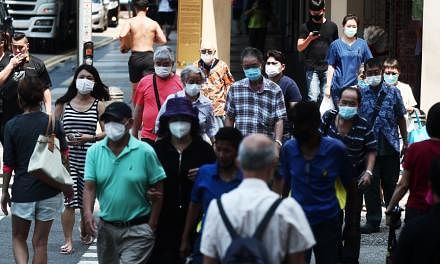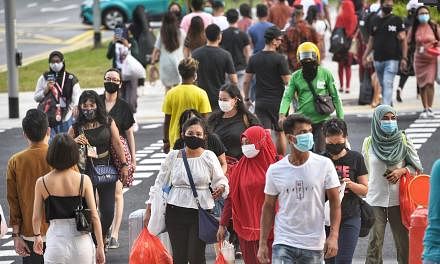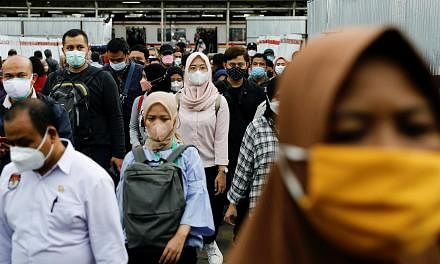Those vaccinated and got infected this year less likely to develop long Covid: NCID
Vaccinated persons in Singapore who had Covid-19 over this recent Omicron wave or the one earlier in the year are much less likely to develop long Covid symptoms, said Dr Barnaby Young, head of the Singapore Infectious Disease Clinical Research Network at the National Centre for Infectious Diseases (NCID).
Long Covid is a condition where people experience symptoms such as chest pain, breathing difficulties and fatigue months after the initial infection has cleared.
“From our experience at NCID, for those who do develop long Covid, the symptoms also tend to be less severe and do not persist so long among vaccinated patients with Covid-19 due to the Omicron variant,” he said.
“While we do not have a diagnostic test or treatment specifically for long Covid, we do have some medication for symptom relief, and usually perform some blood or imaging tests to exclude other causes.”
His comments come as a new Dutch study published in The Lancet medical journal suggests that one in eight adults with Covid-19 may experience long Covid.
“About one in eight patients reporting long Covid is similar to what we have described in Singapore, early in the pandemic,” said Dr Young.
The new study was conducted in the Netherlands by researchers from the University of Groningen. They collected data from online questionnaires on 23 symptoms commonly associated with long Covid from April 2020 to August last year.
The researchers compared the symptoms in people infected with Covid-19 with those who were not infected, which helps to ensure that the symptoms are not confused with non-Covid-19 ones.
They also asked participants if the symptoms were already present before their infection, in order to identify the core symptoms.
This method allows them to offer an improved working definition for long Covid and provide a reliable estimate of how likely it is to occur in the general population, said Professor Judith Rosmalen from the University of Groningen, the study's lead author.
In the study, about 21.4 per cent of 1,782 participants who had Covid-19 experienced at least one new symptom or a symptom that was more severe than before, three to five months post-infection.
This compares with 8.7 per cent of 4,130 uninfected people followed in the same time period, suggesting that one in eight Covid-19 patients (12.7 per cent) in the general population experiences long-term symptoms due to Covid-19, the researchers said.
Around the world, experts are trying to determine who is at risk of long Covid, and what can be done about it.
Researchers have said that long Covid is very challenging to study as it is not clearly defined, having been linked to more than 200 symptoms of varying severity and durations.
There have been various estimates of its prevalence.
In the United States, for instance, data collected in the first two weeks of June by its Centres for Disease Control and Prevention showed that nearly one in five adults still has long Covid symptoms lasting at least three months after their infection.
Last week, a team of Singapore and international researchers published a paper in the British Medical Journal which found that about 5 per cent of the global population may develop long-term issues with their sense of smell or taste after coming down with Covid-19.
In the Lancet study, the core symptoms recorded were chest pain, breathing difficulties, pain when breathing, painful muscles, loss of taste and/or smell, tingling hands or feet, a lump in the throat, alternately feeling hot and cold, heavy arms and/or legs and general tiredness.
The severity of these symptoms plateaued three months after infection with no further decline.
Other symptoms that did not significantly increase three to five months after a Covid-19 diagnosis included headache, itchy eyes, dizziness, back pain and nausea, the researchers said.
The participants are from Lifelines, a large, multi-generational cohort study that includes mostly Caucasians above 18, from the northern part of the Netherlands.
The study approach accounted for symptoms that may have been a result of non-infectious aspects of the pandemic, such as stress caused by restrictions and uncertainty, said first author Aranka Ballering in a release on the study.
Prof Rosmalen said that future research on long Covid should include mental health symptoms such as depression and anxiety symptoms, along with additional post-infectious symptoms such as brain fog, insomnia and post-exertional malaise, which is the worsening of symptoms such as exhaustion, pain or cognitive dysfunction after minimal physical or mental activity.
Commenting on the Dutch study, Dr Barnaby Young, head of the Singapore Infectious Disease Clinical Research Network at the National Centre for Infectious Diseases (NCID) said it is very well conducted and has good quality data, particularly longitudinal symptom data, collected before and after acute Covid-19, and symptom data from a control group who did not have Covid-19.
"The importance of this control group for interpreting symptom data is shown by the 40.7 per cent of individuals who had Covid-19 and reported symptoms of moderate severity, and yet so did 29.3 per cent of those who did not have Covid-19," Dr Young said.
"This control group makes it possible to estimate which symptoms can be attributed to long Covid, rather than something else."
In a linked comment to the Dutch study, Professor Christopher Brightling and Dr Rachael Evans of the Institute for Lung Health at the University of Leicester, England, who were not involved in the study, said that current evidence supports the view that long Covid is common and can persist for at least two years, although severe debilitating disease is present in a minority of patients.
Get The New Paper on your phone with the free TNP app. Download from the Apple App Store or Google Play Store now











